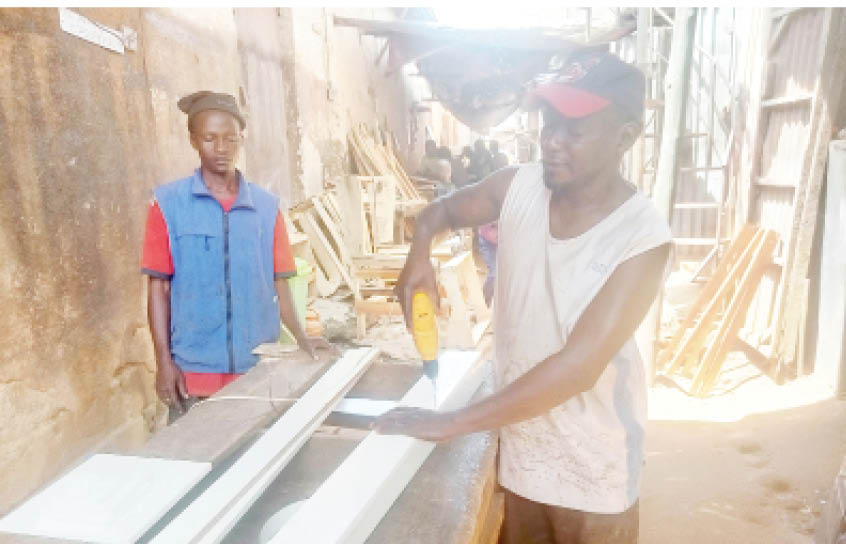Mu’awiya Gambo fled his home and carpentry business at the Laranta Market, in Jos north Local Government Area of Plateau State. This was after he became indebted to several of his clients and had no means to offset the debt.
For over a year, the carpenter, who now resides in the Federal Capital Territory has moved from Lagos, to Kogi and Nasarawa states, before he eventually settled in the FCT to search for carpentry work, which he thought could quickly pay off his debts. But as it is, even in Nigeria’s administrative capital, Gambo has been unable to escape his past as the carpenter says his pile of old debts still await him in Jos.
- Ghana deports 16 Nigerians for engaging in cyber crimes
- National Security Council orders reopening of Dangote cement factory
Apparently, what started as a simple calculation of robbing Peter to pay Paul had become Gambo’s albatross as he tried to navigate a business he says suddenly crashed due to increasing cost of carpentry materials.
“When clients pay you advance for raw materials, you find that a few days later, the price goes up and by the way, two or three other clients may have equally paid you their advances also,” he said.
He said this makes it difficult for carpenters to get the work done while others like himself often make the mistake of taking from one client’s advance payment to complete another client’s work. “And then, we get disappointed by the customers who refuse to pay the difference because they would claim that, that was not the initial agreement. From there, problems will start,” he said.
“After a while, other clients will start to disturb you to get their work done and you have no option than to flee town because you have expended the advances given to you,” he said.
Speaking on the impact of the economic realities on carpenters, Gambo explained that expenses such as renting a shop and family responsibilities had overwhelmed some of his colleagues who had equally fled to Kano State.
Like Gambo, other carpenters in Jos say it is now becoming difficult to sustain their lives due to the high prices attached to furniture materials and the low patronage in recent times. Inflation in Nigeria is currently biting and has affected a significant percentage of businesses, said Shu’aibu Ali, the Chairman of Carpenters Association, Laranto adding that: “So, many of our carpenters have abandoned the profession while others have fled the town due to rising debts.”
“They fled town because they could not withstand the pressure of those who had given them advance payment and they couldn’t finish the work at the expected time,” he said, adding that “because of the advance they have given them and the prices of materials have risen, they ran because they didn’t have money to complete the work at the agreed price and have spent the part payment given to them.”
Explaining the problem, Aminu Ibrahim, a carpenter also at the Laranto market, noted that: “Life has been difficult. Buying the materials for furniture has become expensive and it is affecting our daily lives. Presently, we are living from hand to mouth. Initially, we used to buy food items and store them for a week but now, we have to struggle daily to make up for what to eat daily.”
Other carpenters in the state explained that prices of materials such as MDF wood, form, wood, screw among others have doubled.
On his part, Ali the chairman of the association told our correspondent that the effect of inflation has crippled their businesses, saying in the past, he could make three sets of furniture a day but now barely makes one.
He said: “In the past, after my morning prayers, I used to proceed to the workshop from the Mosque because there was work to be done and everyone expected to get their furniture in time. So, there was no time to waste. But now, one hardly gets to do one set of furniture in a week because people have no money.
“What we used to do when life was very simple was to contribute N500 weekly and buy food stuff for one of our members. The next week, we would do the same for another member until it goes around every member. We are now unable to achieve that because life is difficult.” He added that many carpenters have now turned to manual labour while others have found some financial relief in operating tricycles.
Our correspondent also gathered that some customers have resorted to buying fairly used furniture to cut costs. The chairman of the carpenters while explaining the reason behind the development said customers now buy fairly used furniture not because they prefer them but because of the high cost of purchasing new ones. “Some people can’t afford the new furniture, and therefore have to go for the second-hand furniture which is cheaper,” he said.

 Join Daily Trust WhatsApp Community For Quick Access To News and Happenings Around You.
Join Daily Trust WhatsApp Community For Quick Access To News and Happenings Around You.

